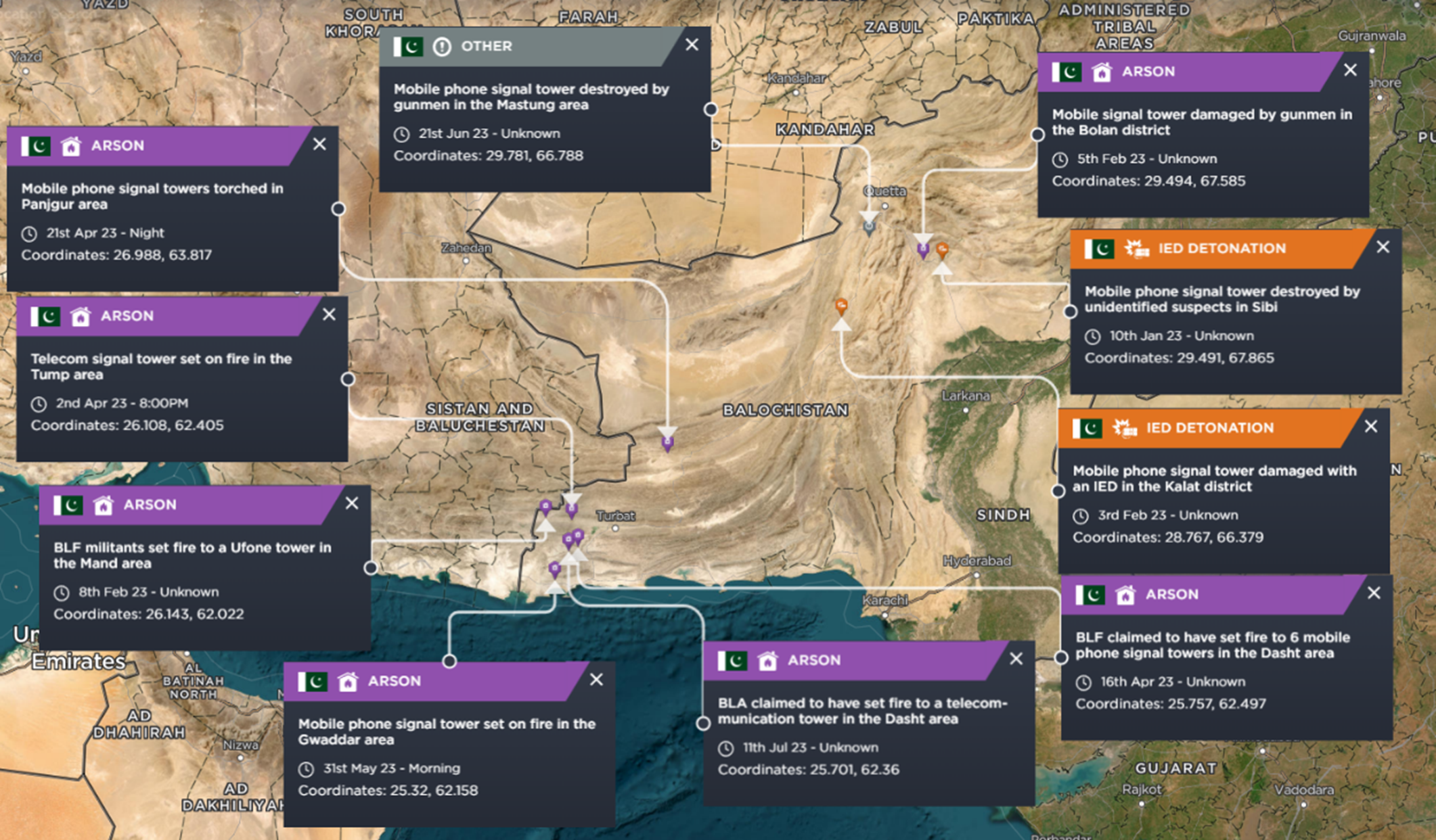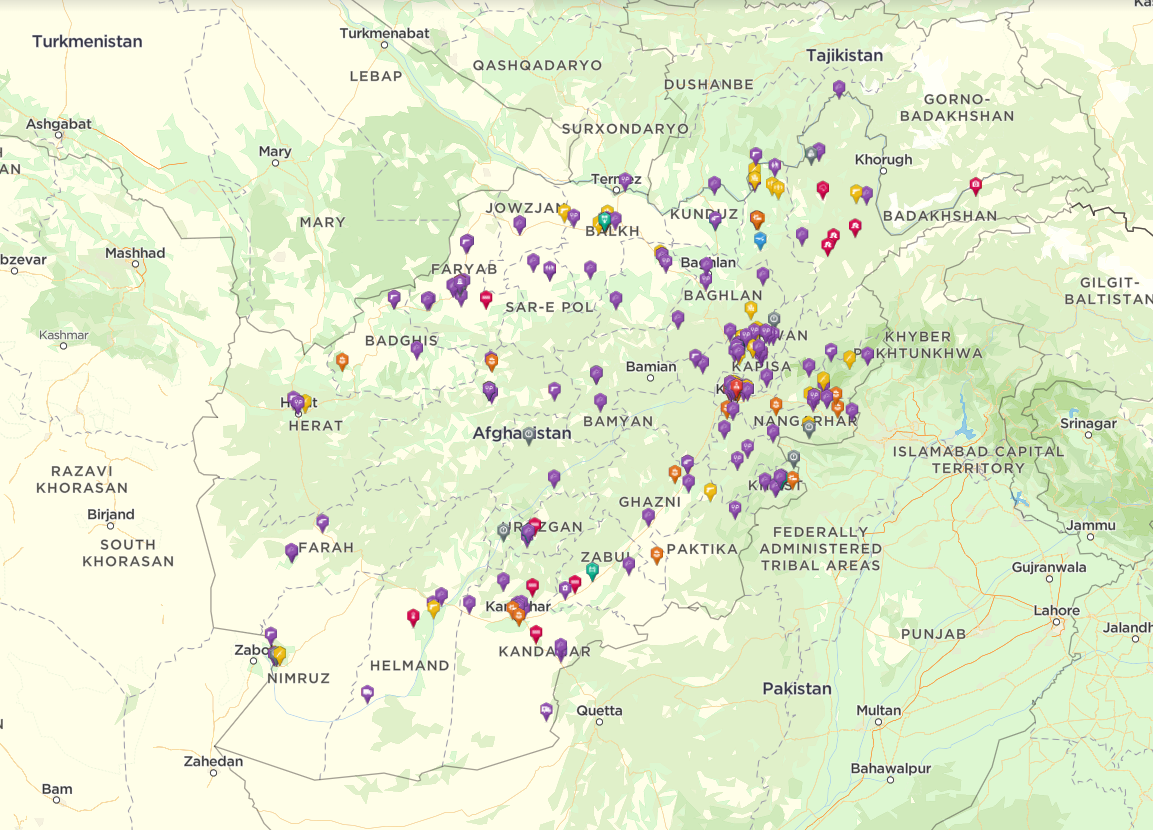Power shifts and pipeline dreams: Navigating economic cooperation between the Taliban’s Afghanistan and Central Asia
A review of the post-2021 landscape of Afghanistan and its neighboring states.
The withdrawal of the US and allied forces has reshaped alliances and tensions. From economic cooperation to water security, this blog unravels the complexities of evolving relationships between Central Asian states.
Summary
- The years following the Taliban seizure of Afghanistan have seen gradual increases in levels of economic cooperation, particularly in areas such as electricity.
- Large-scale projects such as the Turkmenistan-Afghanistan-Pakistan-India (TAPI) Pipeline project continue to be on the agenda, with changes in regional security altering traditional security considerations.
- Taliban water management projects, such as the Qush Tepa Canal project, are expected to strain relations with Central Asian states in 2024.
Following the withdrawal of US and allied forces from Afghanistan in 2021, the relationships between the Afghan Taliban and neighbouring states have changed significantly. In the case of Pakistan, the relationship has oscillated between political support and direct clashes at points along the Afghan-Pakistan border. On Afghanistan’s west, Iran has continued to try and exert influence in the new Taliban regime but has come across considerable challenges, with tensions forming with the Taliban over issues such as the treatment of Afghan refugees in Iran as well as potential future issues such as the subject of water security. In the north, the relationships between the Taliban and Uzbekistan, Turkmenistan and Tajikistan have received far less attention despite the regional consequences that changes to these relationships may cause.
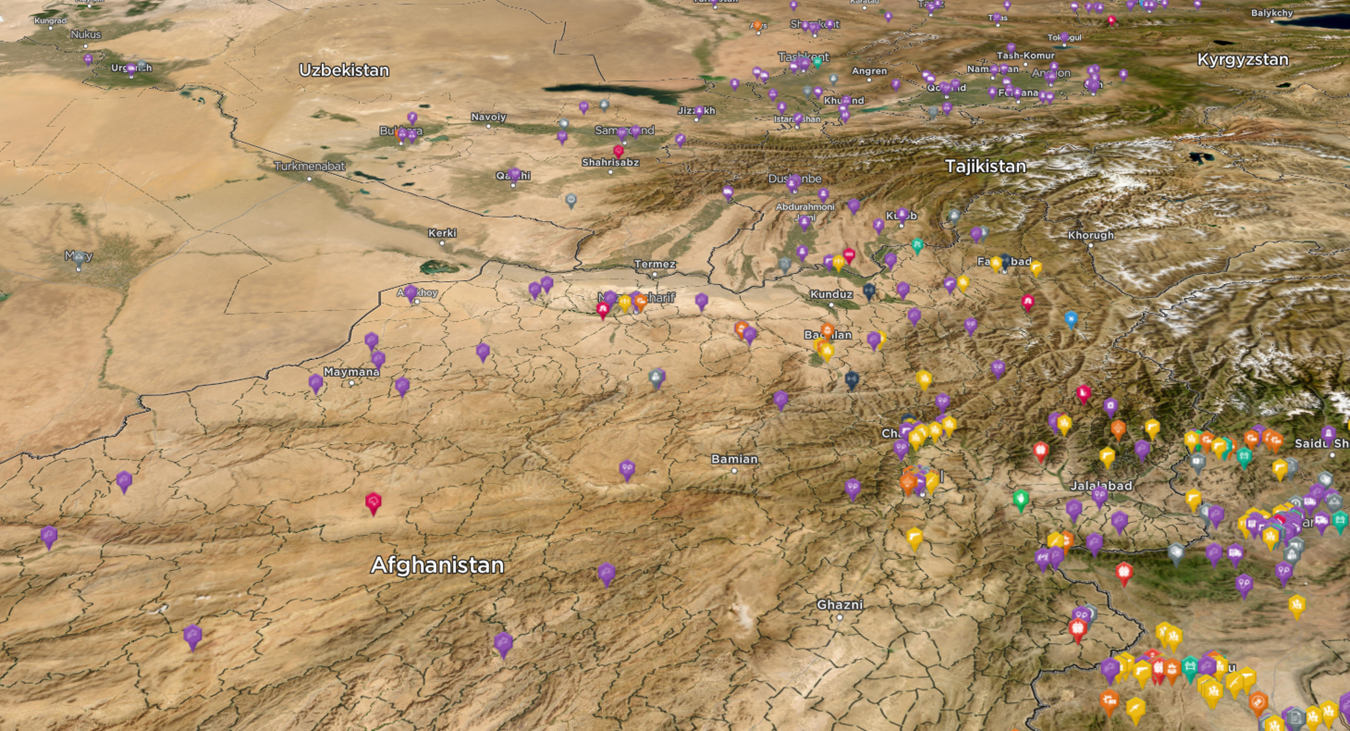
Image shows incidents recorded in the region in January and February of 2024. Taliban restrictions on reporting in Afghanistan have reduced the volume of information available regarding internal security incidents, but reporting highlights that criminal and security incidents are still common [Image Source: Intelligence Fusion].
This blog will provide an analysis of key trends which have influenced the relationships between the Afghan Taliban and bordering Central Asian states within the realm of economic cooperation and water security, with limited reference to physical security concerns as well.
Economic Cooperation
Immediately after the fall of the Afghan government in 2021, Central Asian states were naturally cautious regarding what would happen next, with the Taliban’s approach to the government being unclear at the time. Nevertheless, Central Asian states have maintained plans for significant economic projects in Afghanistan for some time, and after a period of relative quiet, Turkmenistan and Uzbekistan, in particular, appeared keen to continue with these projects.
Turkmenistan’s main flagship project in Afghanistan has traditionally been the TAPI Pipeline. The project, originally formulated pre-US invasion of Afghanistan in 2001, proposed that a large pipeline would stretch between the four countries involved, connecting Turkmenistan’s gas production with energy-hungry markets in South Asia. The project soon stalled as insecurity in Afghanistan heightened following the US intervention, and despite Taliban pledges that they would not target the pipeline, the project stalled due to the substantial security concerns.
Due to geopolitical concerns not only in Afghanistan itself but also in regional issues, the TAPI pipeline has appeared to be a dead end for Turkmenistan, who notably began construction of the pipeline up to the Afghan border in hopes of continuing the project at a future date. Geopolitical tensions have also served to slow the progress of the project in the past as well, with tensions between India and Pakistan continuing to be a major stumbling block. Nevertheless, despite Turkmenistan’s often vague foreign policy statements regarding Afghanistan, Turkmenistan has sought economic cooperation in Afghanistan through other, less risk-sensitive projects.
For example, ministers from Turkmenistan and Afghanistan met in December of 2023 in Herat in western Afghanistan. As well as the TAPI project, the delegation is reported to have spoken about multiple topics, including a high voltage power transmission line between Turkmenistan, Afghanistan and Pakistan as well as expanding Afghanistan’s railway network with the help of Turkmen investment.
Uzbekistan’s approach has similarities with the Turkmenistan approach to economic cooperation in Afghanistan. Uzbekistan has traditionally been a major vendor of electricity to Afghanistan and has sought to find ways to improve Afghanistan’s electricity infrastructure and pave the way for additional demand for Uzbek power. A meeting between a Uzbek delegation and Taliban officials in October 2023 touched mostly on relatively small goals (in contrast to Turkmenistan’s grander aspirations in the form of the TAPI project). The delegation discussed issues such as how to increase trade between the two countries and how to manage tariffs on each other’s goods.
Lastly, Tajikistan’s relationship with the Taliban has been more confrontational than neighbouring states, and this has inevitably impacted the level of economic cooperation. Reports that members of Jamaat Ansarullah (often referred to as ‘Tajik Taliban’ due to high numbers of Tajik fighters) were deployed to Afghanistan’s Badakhshan province impacted relations in 2021. Since then, reports of JA fighters attempting to infiltrate into Tajikistan have been reported in Tajik media, with two notable shootouts reported on the Afghan-Tajik border in 2023, as seen in the image below, with Tajik authorities claiming that JA was involved in both. Pro-Taliban accounts have also openly accused Tajikistan of supporting IS-KP, highlighting cases of ethnic Tajik fighters carrying out IS attacks not just in the region but further abroad too.
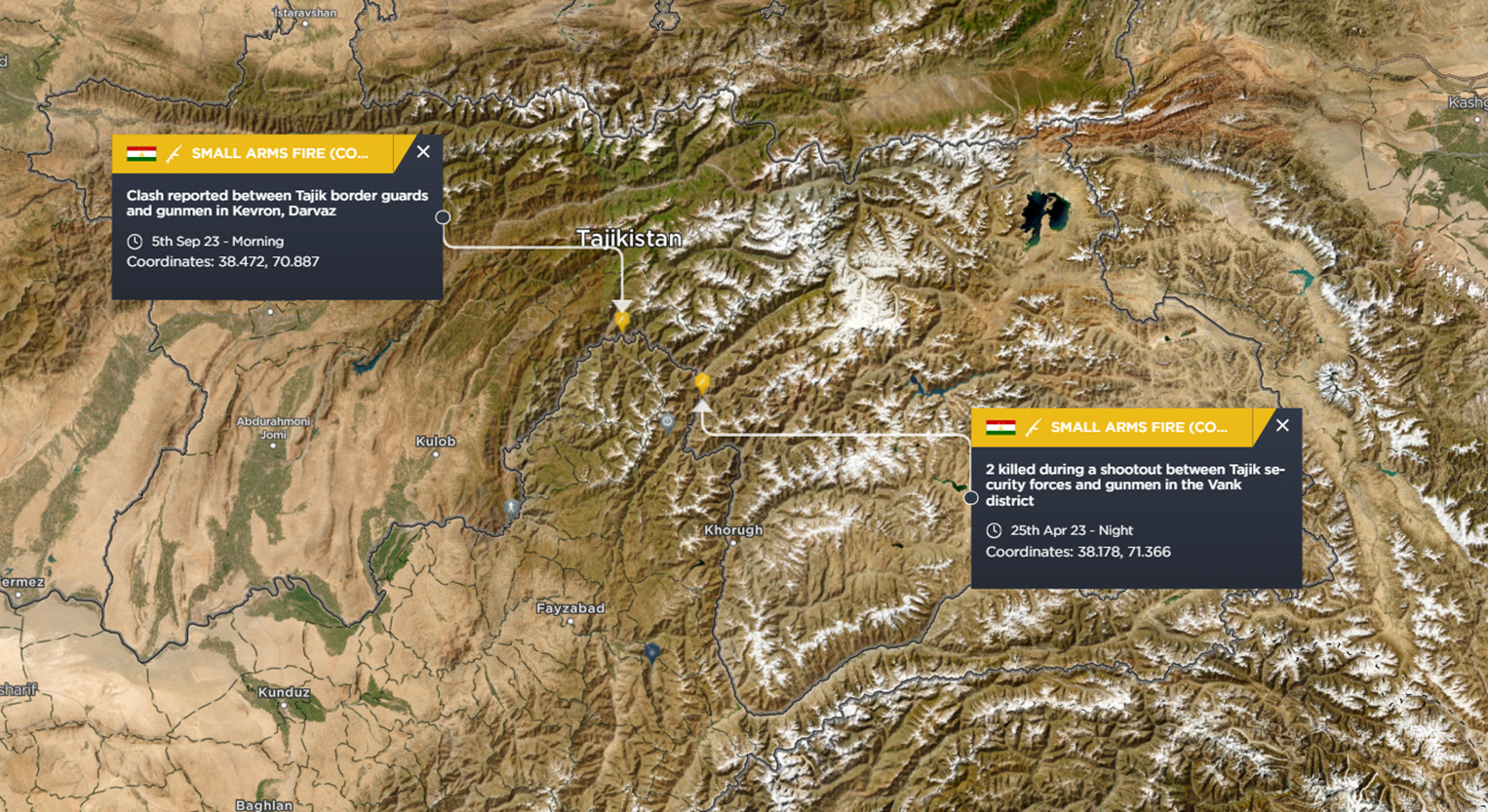
Image shows locations of two incidents reported to have involved Jamaat Ansarullah in 2023 [image source: Intelligence Fusion].
Despite these issues, Tajikistan has implemented more limited agreements, mostly in the area of the sale of electricity to Afghanistan. In February of 2024, a spokesperson for the Barki Tojik company, a state-owned electricity provider in Tajikistan, announced to reporters that Tajikistan intends to increase electricity sales to Afghanistan by 17%, claiming that the Taliban government is a reliable payer (Eurasianet 2024) after the Taliban government paid off energy debts to neighbouring countries in early 2024 (Amu 2024).
What next in the area of Economic Cooperation?
For Turkmenistan, getting momentum back into the TAPI project will likely be a key concern going forward. For many, the project may already be at its natural end due to decades of postponement and funding issues. However, the ascension of the Taliban to power in Afghanistan and the consequent reduction in fighting across the country between the Taliban and the former government may change previous assumptions about the project. The Taliban were highly active in western and southern provinces (which the pipeline traverses) during the years leading up to the fall of the government, raising serious concerns about the former government’s ability to provide security to such a major project. Even with Taliban assurances that the pipeline would not be attacked, incidents such as alleged arrests of ‘Iranian-Trained Taliban fighters’ who intended to attack the project in 2018 and attacks on deminers working on the project raised concerns and effectively sidelined the project.
Even with a significant reduction in fighting in Afghanistan since the Taliban seizure of power in mind, anti-Taliban militias do exist in the country and continue to carry out regular attacks against the Taliban. With this said these groups are generally concentrated in Afghanistan’s northern and central provinces, where large minority communities can be found. Furthermore, these groups would likely refrain from attacking major projects that may bring value to Afghanistan for fear of alienating themselves from their support bases. Islamic State – Khorasan Province (ISKP), on the other hand, does not share these concerns, and targets such as the TAPI pipeline or other infrastructural projects would create tempting targets and would cause major disruption to the Taliban and foreign backers.
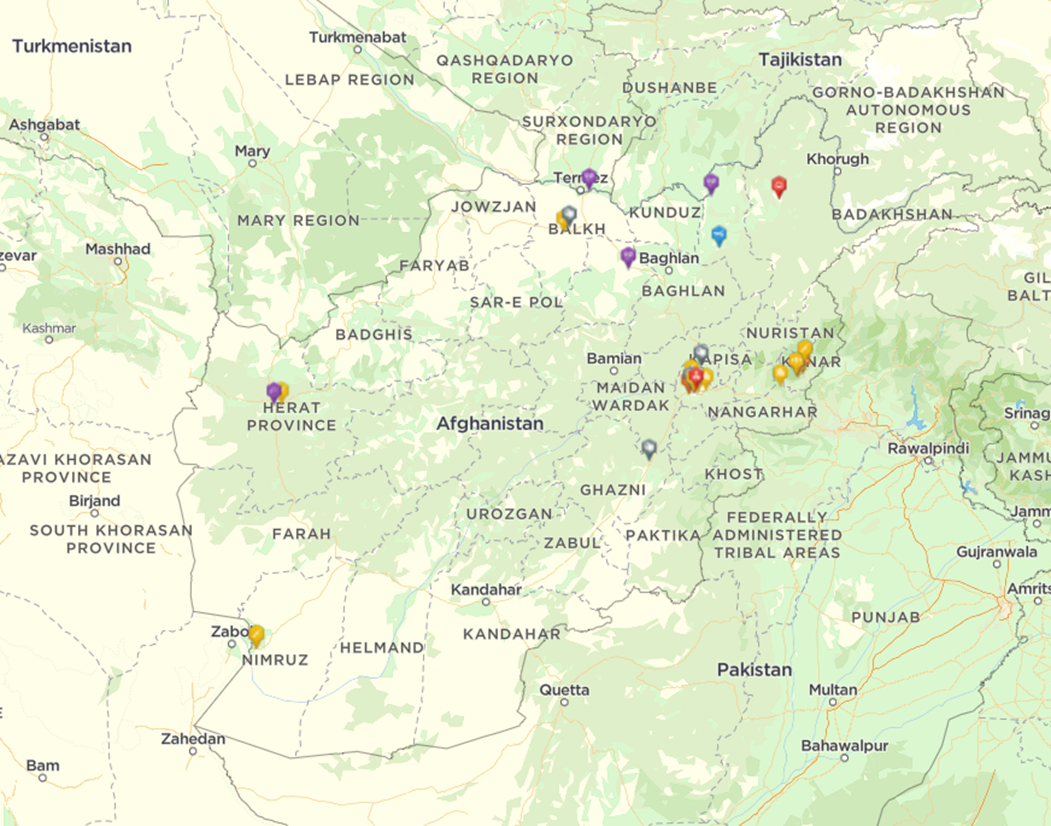
Image shows locations of incidents involving IS-KP in 2023. Note that the majority of attacks are carried out in Kabul where IS-KP is believed to maintain multiple cells. IS-KP has extended its influence in northern provinces [image source: Intelligence Fusion].
For Uzbekistan, whilst multiple avenues of approach have been explored (such as railway transport), it is clear that there is a strong demand for electricity in Afghanistan, and demand for Uzbek supplies of electricity can therefore be assumed to be long-term. Whilst this provides some certainty for Uzbek cooperation in this field, Afghanistan’s previous ability to pay for the electricity supplied by Uzbekistan may derail electricity provisions on an ad-hoc basis. A recent major payment of debts to electricity suppliers from the Taliban in February 2024 will offset much of these concerns, but suppliers will likely still be proceeding with caution. Uzbekistan itself has witnessed energy shortages, particularly in winter months, and this, coupled with the Taliban’s unpredictable economic state, may de-incentivise such projects or limit the potential gains to be made.
Water Security
Lastly, water security has, for many years, been a significant concern for Central Asian states, which have witnessed periods of drought and water scarcity at alarming rates. In addition, water management projects in Afghanistan have fanned tensions, often creating geopolitical disputes over usage and water-sharing agreements. Between Afghanistan and the broader Central Asia region (not just the states which border Afghanistan), the Qush Tepa Canal project poses a substantial threat to the relationships between Central Asian states and the Afghan Taliban.
The Qush Tepa Canal is an ambitious project which aims to divert water from the Amu Darya River and use it to irrigate large areas of land in northern Afghanistan. If completed, the project may see a reduction in the volume of water passing through the Amu Darya by up to one-third. For Central Asia, this reduction is unacceptable, as the Amu Darya is a vital waterway which supplies agricultural land in Uzbekistan’s Khorezm and Karakalpakstan areas, as well as agricultural areas in Turkmenistan.
The Uzbek and Turkmen governments have sought to convince the Taliban to reach an agreement regarding the canal. In response, the Taliban have stated that they are willing to cooperate, but ultimately, they intend to complete the canal project despite the protests of their northern neighbours. For the Taliban, water management has become a key area where the group feels that they can alleviate Afghanistan’s economic issues, which threaten to undermine the Taliban government. The Taliban, in late 2023 and early 2024, announced a flurry of water management projects, mostly in the form of dams aimed at supporting local agriculture. In the case of the Qush Tepa project, the canal is a major flagship project, and it should be noted that plans to build the canal have circulated in Afghan governmental discourse for years.
The Central Asian states, particularly Uzbekistan and Turkmenistan, therefore face a substantial hurdle. The Taliban appear to be unwilling to compromise on the issue, and the closer to completion the canal gets, the more leverage the Taliban will possess. The Taliban’s stance on the issue has been consistent in that the project is within Afghanistan, and no external state can force them to alter their plans. For ministers searching for precedent regarding water sharing in the region, actual agreements are few and far between, date back to the Soviet period, and do not include Afghanistan as a signatory. Furthermore, whilst Uzbekistan and Turkmenistan have sought cooperative relationships with the Taliban, it can be assumed that both sides will be wary of the degree to which the Taliban can be trusted to adhere to multinational water-sharing agreements.
Conclusion
As outlined, policies regarding economic cooperation with Afghanistan have varied depending on the state in question, with Central Asian states all pursuing pragmatic approaches. Regional governments have varied in attitudes, from Tajikistan’s more restrained level of cooperation due to security concerns to Turkmenistan’s seemingly unchanged efforts to complete the long-postponed TAPI Pipeline project. To varying degrees, all states have expressed a willingness to engage with the Taliban, seeing Afghanistan as a potential market for trade and investment.
Nevertheless, despite levels of optimism from all sides involved, including the Taliban, fundamental concerns over internal security in Afghanistan and the Taliban’s government’s ability to attract investment remain. On the horizon, future issues, such as the Taliban’s push to create water security projects such as the Qush Tepa Canal, present major potential geopolitical issues, which, if not coordinated with Central Asian states, will undermine relations and any potential economic cooperation.
Discover more about the Central Asia region and how threat intelligence collected, processed, analysed and disseminated by our 24/7 operations team can support your business. With 159 different incident types on our platform, the granularity and accuracy of reporting is unmatched. With some of the largest energy, retail and financial organisations using our platform to support their security teams, we are confident we can offer value to help you effectively protect your business, people and assets.


